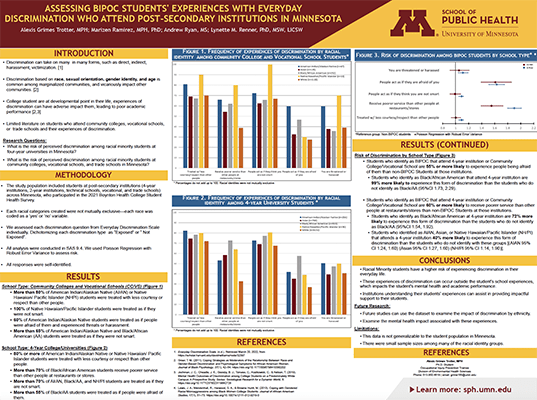Alexis Grimes Trotter
PhD, Environmental Health
Co-Authors:
Marizen Ramirez, Andrew Ryan, and Lynette Renner
Advisor:
Marizen Ramirez
Keywords:
BIPOC Students, discrimination
Abstract
Background: There is limited literature on the experiences of discrimination among students who attend
community colleges, vocational schools, or trade schools and how these compare to those among
students at 4-year colleges/universities.
Methods: We analyzed data from the 2021 Boynton Health College Student Health Survey that used
questions from the Everyday Discrimination Scale (EDS) to assess experiences of discrimination. We
dichotomized each discrimination type—no exposure to any exposure—to examine risk. Poisson
regression with robust error variance compared risks for each act of discrimination between BIPOC and
Non-BIPOC students, controlling for potential confounders associated with discrimination at the
interpersonal level. Models were stratified by post-secondary institution type.
Results: BIPOC students across both institution types are 62% more likely to experience people acting
as if they are afraid of them than students who do not identify as BIPOC (95%CI 1.52,1.73). At 4-year
institutions, BIPOC students are 90% more likely to experience poorer service than other people at
restaurants or stores compared to non-BIPOC students (95%CI 1.80,2.01). At community
colleges/vocational/trade schools, BIPOC students are 55% more likely to experience poorer service
than other people at restaurants or stores compared to non-BIPOC students (95%CI 1.39,1.73). BIPOC students across both institution types are 9% more likely to experience threats or harassment than non-
BIPOC students (95%CI 1.03,1.16). American Indian/Alaskan Native and Black/African American students had the highest risks of experiencing discrimination.
Conclusions: BIPOC students across Minnesota, regardless of institution type, disproportionately
experience discrimination. Institutions understanding their students’ risk of experiencing discrimination
can lead to population-based levels of support.

View Poster (PDF)
